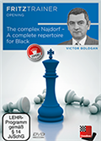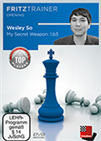No more handshakes
 No, we don’t shake hands with friends any more. If we do, we run the risk of shaking hands with Death itself next time. In the picture here both Grischuk and his rival Nepomniachtchi are doing their best to get used to the “new normal” even as they see the looming shadow of the pandemic over the Candidates in which they are both playing.
No, we don’t shake hands with friends any more. If we do, we run the risk of shaking hands with Death itself next time. In the picture here both Grischuk and his rival Nepomniachtchi are doing their best to get used to the “new normal” even as they see the looming shadow of the pandemic over the Candidates in which they are both playing.
As is known, that abomination of an event held amidst the macabre dance of death all round was called off for an indefinite period, and it was announced that it would resume at a later date. Among other things, this issue includes all the games from that unfinished event. For now there are 29 games from 7 rounds, and they are annotated by Anish Giri, Romain Edouard, Michal Krasenkow and Boris Gelfand. These games were played in rather strange circumstances and it’s curious that the annotations make no mention of them altogether.
Firouzja wins in Prague
I was happier seeing the games from the Prague Masters 2020, with 21 of them beautifully annotated by the players themselves. As is known, Alireza Firouzja won the event after a blitz play-off with Vidit Gujrathi ahead of David Anton, Jan Duda and Sam Shankland. I was struck by the candour and friendly spirit with which each player commented on his rival’s game. Here is just one of them:
 When choosing an opening repertoire, there are days when you want to play for a win with Black, when you want to bear down on your opponent’s position with a potentially crushing attack. The Najdorf is perfect for just such occasions. Strategy, combinations, attack and defence, sacrifices and marvellous manoeuvres — exciting chess is all about the Najdorf!
When choosing an opening repertoire, there are days when you want to play for a win with Black, when you want to bear down on your opponent’s position with a potentially crushing attack. The Najdorf is perfect for just such occasions. Strategy, combinations, attack and defence, sacrifices and marvellous manoeuvres — exciting chess is all about the Najdorf!I was also interested in seeing the blitz play-off between Vidit and Alireza and struck by the standard of play, all in mere 5 minutes.

Alireza Firouzja v Vidit Gurathi | Photo: praguechessfestival.com
A terrible debacle and the dispirited Vidit went down in the second game as well, making it 2:0 for Alireza.
Women elite players gather in Lausanne
I am very sympathetic to women’s chess (girls, please come and join the boys). In this issue, we have all the games from the FIDE Grand Prix in Lausanne won by Nana Dzagnidze, ahead of Aleksandra Goryachkina on tie-break with a score of 7/11.

The deciding face-off between Dzagnidze and Goryachkina | Photo: David Llada
But somehow I could not enthuse myself over the games, and it’s rather unfair to the players who fought well and hard. So let not readers be swayed by my facile impression here. Perhaps there is more to these games than meets the eye. Do check out the annotations by Nana Dzagnidze, Aleksandra Goryachkina, Anna Muzychuk, Ju Wenjun and, last but not least, Zhansaya Abdumalik to their games.
Suleymanli stuns in Moscow
For some reason the Moscow Aeroflot Open Tournament does not get the billing as a top tournament in this issue. All the games are there, though.

Aydin Suleymanli | Photo: Eteri Kubashvili
As is known, fourteen-year-old Aydin Suleymanli won the tournament on tie-break with a score of 6½ points out of 9 ahead of Rinat Jumabayev and Rauf Mamedov. This was a strong field of 97 players with Artemiev, Sjugirov and Sargissian among them.
I think, the older opponents of Suleymanli underestimated him, like Ilya Smirin here, who went down before he knew what was happening.
Aleksandar Colovic, who annotated this game in British Chess Magazine, wondered why the veteran grandmaster did not employ the King’s Indian in which he is one of the greatest experts. Smirin has written a whole book on it (King’s Indian Warfare, New in Chess. 2016).
Probably he thought his young rival had read the work and wanted to sidestep his preparation. That was a mistake. But then, it is not easy to put yourself in the loser’s place.
Rauf Mamedov deserved better than his final placing in this event. Here is a game illustrative of his dynamic play:
 Meanwhile, 1.b3 has also found its way into the practice of today's world elite, and now finally a modern top ten player has taken on the subject for ChessBase: none other than Grandmaster Wesley So!
Meanwhile, 1.b3 has also found its way into the practice of today's world elite, and now finally a modern top ten player has taken on the subject for ChessBase: none other than Grandmaster Wesley So!The sporting grandmaster was only too happy for his young friend to have won the event.

Azerbaijani stars Rauf Mamedov and Aydin Suleymanli | Photo: Eteri Kubashvili
This brings me to the rest of the DVD. Apart from standard features on middlegame tactics, endgame play and training, this issue has as many as eleven opening surveys ranging from the Ruy Lopez to the Reti. Among them, I would single out the article on the Sicilian Sveshnikov by Robert Ris, which analyses just one line — 9.Bf6 gf6 10.Nd5 Bg7. Here I am offering a glimpse of the same with a commentary of my own.
Robert Ris rightly points out that much of the current work on this sharp variation is done in correspondence chess. He is only right, and for the same reason I have included quite a few correspondence games in the commentary.
Apart from these surveys, there are regular sections on opening traps, middlegame tactics and endings. There is much else in this DVD that deserves to be explored. The main database of the issue has 918 recent games of which 32 are deeply annotated. Apart from the GMs I have already mentioned, the commentators include Krasenkow, Vitiugov and Navara, among others. A major contribution is made by Roman Edouard, who has annotated 8 games. It may be noted that there are more annotated games in the sections on opening theory and training.
Well, practice makes perfect.
Recommended.
Links


















 No, we don’t shake hands with friends any more. If we do, we run the risk of shaking hands with Death itself next time. In the picture here both Grischuk and his rival Nepomniachtchi are doing their best to get used to the “new normal” even as they see the looming shadow of the pandemic over
No, we don’t shake hands with friends any more. If we do, we run the risk of shaking hands with Death itself next time. In the picture here both Grischuk and his rival Nepomniachtchi are doing their best to get used to the “new normal” even as they see the looming shadow of the pandemic over 




